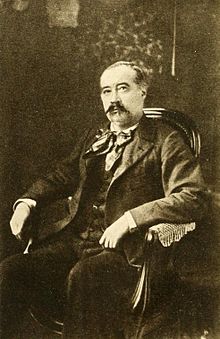Émile Faguet
| Émile Faguet | |
|---|---|

Portrait of Faguet, by Henri Mannes
|
|
| Born | Auguste Émile Faguet 17 December 1847 La Roche-sur-Yon, Vendée |
| Died | 7 June 1916 (aged 68) Paris |
| Occupation | Literary critic, and author |
| Alma mater | École normale supérieure |
| Notable works | The Cult of Incompetence |
| Spouse | Suzanne Travichon |
| Children | none |
Auguste Émile Faguet (French pronunciation: [emil faɡɛ]; 17 December 1847 – 7 June 1916) was a French author and literary critic.
Faguet was born at La Roche-sur-Yon, Vendée, and educated at the École normale supérieure in Paris. After teaching for some time in La Rochelle and Bordeaux, he returned to Paris to act as assistant professor of poetry in the university. He became professor in 1897. He was elected to the Académie française in 1900, and received the ribbon of the Légion d'honneur in the next year.
He acted as dramatic critic to the Soleil; from 1892 he was literary critic to the Revue Bleue; and in 1896 took the place of Jules Lemaître on the Journal des débats. He died in Paris, aged 68.
Politics
"The man of the middle class ought to lead society. The simple truth is that he has led it, ever since there has been such a thing, as if predestined to do so. In this case theory is confirmed by the fact. The man of the middle class leads society because it is he who creates public opinion."
"Law is an aristocratic thing; only the emergency law, the decree, is democratic. For this reason Montesquieu always speaks of a monarchy as being limited, and, at the same time, maintained by its law. What did this mean in his day, when there was no “expression of the general will” to limit monarchy, and when royalty possessed legislative power, and could at will make and remake laws? It could only mean one thing, namely, that Montesquieu’s conception of law was the same as that of the ancient sociologists, — law far older than his time, “fundamental laws” as he calls them, of the ancient monarchy, which still bind and ought so to bind the monarch, whose rule without them would be despotism or anarchy. Law is essentially aristocratic. It ordains that rulers should govern the people, and that the dead should govern the rulers. The very essence of aristocracy is the rule of those who have lived over those who live, for the benefit of those who shall live hereafter. Aristocracy, properly so called, is an aristocracy in the flesh. Law is a spiritual aristocracy. Aristocracy, as represented by the aristocrats of to-day, only represents the dead by tradition, inheritance, education, physiological heredity of temperament and characteristics. Law does not represent the dead, it is the dead themselves, it is their very thought perpetuated in immutable script."
...
Wikipedia
